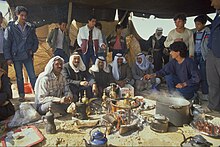Bedouin Negev
Negev Bedouin (bahasa Arab: بدو النقب, Badū an-Naqab; Ibrani: הבדואים בנגב, HaBedu'im BaNegev) biasanya adalah suku-suku Arab nomadik pastoral (Bedouin) yang tinggal di wilayah Negev, Israel. Suku-suku Bedouin menganut Islam.[4]
 Masyarakat Bedouin di sebuah hafla | |
| Jumlah populasi | |
|---|---|
| Lebih dari 200.000 | |
| Daerah dengan populasi signifikan | |
| 200.000-210.000[1][2][3] | |
| Bahasa | |
| Arab (terutama dialek Bedouin, juga Mesir dan Palestina), Ibrani (Israel Modern) | |
| Agama | |
| Islam | |
| Bagian dari seri |
| Islam |
|---|
 |
Referensi
sunting- ^ "Arrests at protest over Israel's Bedouin plan". Al Jazeera English. 1 December 2013. Diakses tanggal 9 February 2014.
- ^ Noreen Sadik. "Israel's Bedouin population faces mass eviction -- New Internationalist". Diakses tanggal 29 May 2016.
- ^ "Behind the Headlines: The Bedouin in the Negev and the Begin Plan". Kementerian Urusan Luar Negeri Israel. 4 November 2013. Diakses tanggal 9 February 2014.
- ^ "Bedouin Life". Diarsipkan dari versi asli tanggal 2016-03-07. Diakses tanggal 29 May 2016.
Bacaan tambahan
sunting- Abu-Saad, I. (2003). "Bedouin Arabs in Israel between the Hammer and the Anvil: Education as a Foundation for Survival and Development." In Champagne, D. and Abu-Saad, I. (eds) Future of Indigenous Peoples: Strategies for Survival and Development. Los Angeles: UCLA American Indian Studies Center, pp. 103–120.
- Ben-David, Y. "The Bedouins in Israel — Land Conflicts and Social Issues." Jerusalem, Jerusalem Institute for Israel Studies, Jerusalem, (2004)
- Eran Razin and Harvey Lithwick."The Fiscal Capacity of the Bedouin Local Authorities in the Negev" and "Investment Opportunities in the Bedouin Urban Sector"; Ben Gurion University, 2000
- Forbes, Andrew, and Henley, David, People of Palestine (Chiang Mai: Cognoscenti Books, 2012), ASIN: B0094TU8VY
- Shamir, R. (1996) "Suspended in Space: Bedouins under the Law of Israel". Law & Society Review v30 (2), p. 231-57
- "Resolution adopted by the General Assembly -- without reference to a Main Committee (A/61/L.67 and Add.1)-- 61/295. United Nations Declaration on the Rights of Indigenous Peoples"; UN, Sept. 13 2007
- Yocheved Miriam Russo. "The Battle to settle the Negev" Diarsipkan 2005-11-23 di Wayback Machine., The Jerusalem Post, June 16, 2005
- Khalidi, Walid (1992), All That Remains: The Palestinian Villages Occupied and Depopulated by Israel in 1948, Washington D.C.: Institute for Palestine Studies, ISBN 978-0-88728-224-9
- Bedouins in the State of Israel // The Knesset - Lexicon of Terms
Pranala luar
sunting- Basic information about the Bedouin of the Negev
- Everything about the Negev Bedouin Way of Life Diarsipkan 2012-03-20 di Wayback Machine.
- Negev Institute for Strategies of Peace and Development
- Israel's Bedouin villages struggle for existence[pranala nonaktif permanen] in the Harvard Law Record
- BBC - Israel's forgotten Bedouin
- Joe Alon Bedouin cultural center and museum in Lahav Forest
- UNRECOGNIZED Photo Exhibition Diarsipkan 2008-09-10 di Wayback Machine. Stories of unrecognized villages, by Tal Adler
- Counterpunch Article reproduced from Le Monde Diplomatique.
- Lands of the Negev di YouTube, a short film presented by Israel Land Administration describing the challenges faced in providing land management and infrastructure to the Bedouins in Israel's southern Negev region
- Seth Frantzman, Presentation to Regavim about Negev
- EoZNews: The Bedouin problem in the Negev di YouTube
- JNF ebook